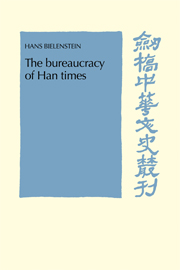Book contents
- Frontmatter
- Contents
- List of tables
- Preface
- Chronological table of emperors
- Abbreviations
- 1 The sources
- 2 The central administration
- 3 The local administration
- 4 The army
- 5 The salaries of the officials
- 6 Civil service recruitment
- 7 Power in government
- 8 Conclusion
- Notes
- Appendix: Official titles of the Han dynasties, Chinese–English
- Quoted literature
- Index
6 - Civil service recruitment
Published online by Cambridge University Press: 04 August 2010
- Frontmatter
- Contents
- List of tables
- Preface
- Chronological table of emperors
- Abbreviations
- 1 The sources
- 2 The central administration
- 3 The local administration
- 4 The army
- 5 The salaries of the officials
- 6 Civil service recruitment
- 7 Power in government
- 8 Conclusion
- Notes
- Appendix: Official titles of the Han dynasties, Chinese–English
- Quoted literature
- Index
Summary
The civil-service recruitment system of the two Han dynasties is the forerunner of China's famous examination system which reached maturity in Sung and Ming times. In comparison to its future glory, the Han system was crude and open to corruption. But in spite of flaws, Han civil-service recruitment provided the government with sufficiently competent candidates for office, and at the height of Former and Later Han the officials fulfilled their duties efficiently and well. All free men were eligible for official employment, unless they were enregistered as traders in the marketplaces. The exclusion of merchants had been in force from the beginning of Former Han (HS 24B:4a), and an edict of 142 B.C. refers to it as a matter of course (HS 5:10a). It is possible, nevertheless, that the rule was broken at times, since the high officials thought it necessary to restate in 7 B.C. that merchants should not be allowed to become officials (HS 11:3a).
The most honourable way of taking up office was to do so in response to imperial summons. In such cases, the emperor could make his own choice or accept the recommendations of high officials. Those who received imperial summons were ordinarily brought to the capital by Official Carriage (kung-chü; e.g. HHS 71,101:1a, chih 25:8a). As an exceptional courtesy, they would be taken there by Comfortable Carriage (an-chü, HHS 53,83:6b; 83,113:1lb) or even by Comfortable Carriage with Wheels Wrapped in Rushes (an-chü p'u-lun, HS 51:29a).
- Type
- Chapter
- Information
- The Bureaucracy of Han Times , pp. 132 - 142Publisher: Cambridge University PressPrint publication year: 1980



